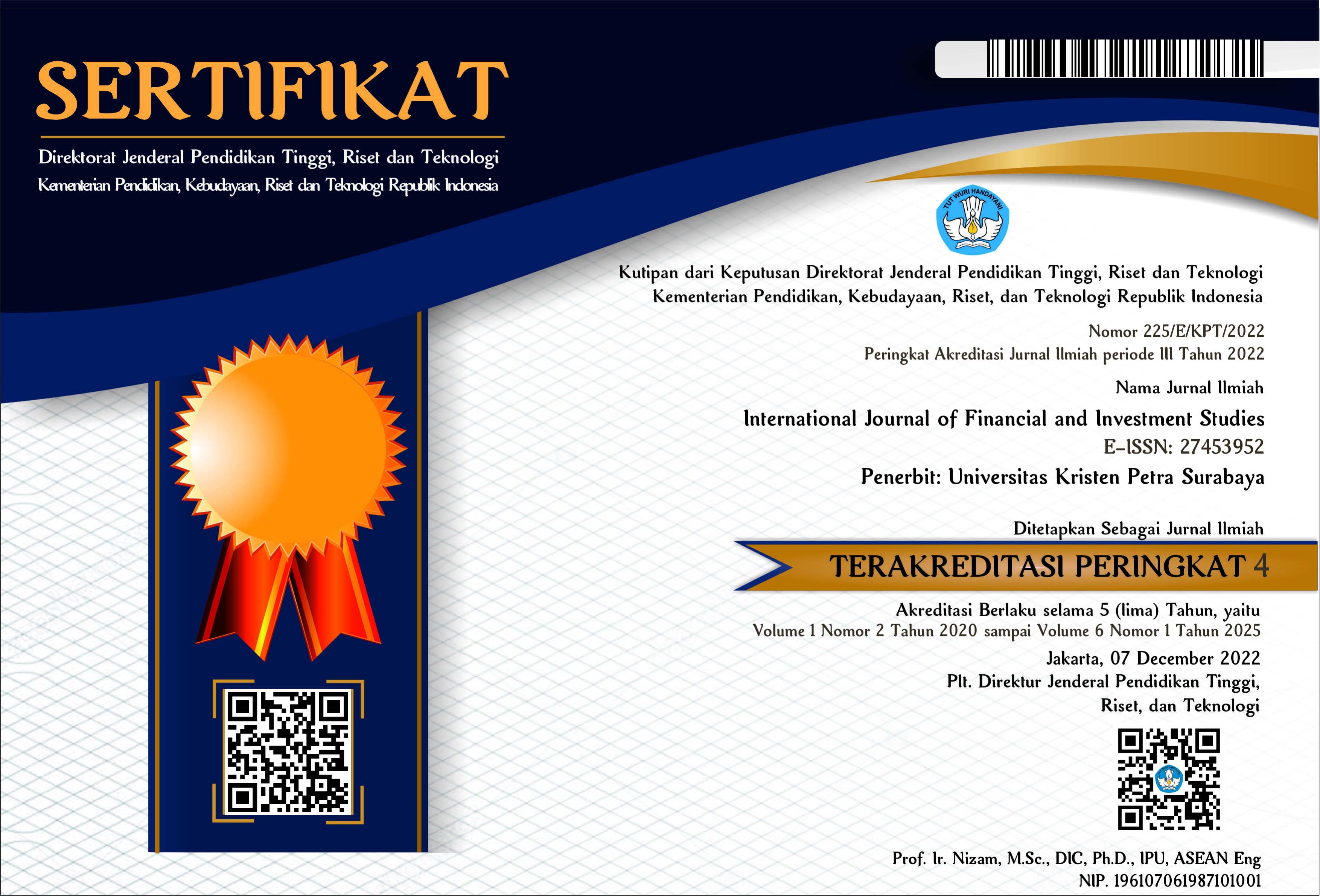THE MODERATOR EFFECT OF FINANCIAL APPS ON THE RELATIONSHIP BETWEEN FINANCIAL EDUCATION AND FINANCIAL CAPABILITY
Abstract
This study aims to determine the effect of Socio-Demographic and Financial Education on Financial Capability with Financial Apps as the moderator variable. The research population is Generation Z aged 19-26 years. The research sample amounted to 100 respondents and data collection was done through the distribution of questionnaires via google form. The data analysis method used is Partial Least Square (PLS). In the industrial era 4.0, which is growing rapidly at this time, financial applications that are designed to help people manage finances have begun to appear. Digital financial management applications make people manage personal finances easily and practically. Financial management applications encourage people to further upgrade their knowledge about financial management to achieve financial goals in the future. The results showed that gender had a significant effect on financial capability and financial apps played a role in moderating the influence of gender on financial capability.
References
Annisa, T. (2021). 18 of The Best Financial Management Apps for Android and Ios. Retrieved July 28, 2022 (https://www.ekrut.com/media/agar-gaji-aman-ini-5-the-best-application-pengatur-financial)
Azeez, A., & Akhtar, J., (2020). Gender Differences in Financial Literacy: Evidence from India. Saudi Journal of Economics and Finance, 4(11):521–528. doi: 10.36348/sjef.2020.v04i11.004.
Basana, S. R., & Tarigan, Z. J. H. (2021). The Effect of Essential Information and Disposition Effect on Shifting Decision Investment. Accounting, 8(2), 264-276. doi: 10.5267/j.ac.2021.6.015
Dion. (2020). 11 Best Financial Management Apps for Budgeting. Life Guide. Retrieved January 12, 2022 (http://avrist.com/lifeguide/2020/01/21/11-aplikasi-pengatur-keuangan-terbaik-untuk-menyusun-anggaran/).
French, D., McKillop, D., & Stewart, E. (2020). The Effectiveness of Smartphone Apps in Improving Financial Capability. The European Journal of Finance, 26(4–5):302–18. doi: 10.1080/1351847X.2019.1639526.
Gabriel, F., & Linawati, N. (2020). Pengaruh Financial Capability, Money Attitudes, dan Socioeconomic Status terhadap Adverse Financial Events. International Journal of Financial and Investment Studies (IJFIS), 1(1), 15-20. doi: https://doi.org/10.9744/ijfis.1.1.15-20.
Gosal, R., Astuti, D., & Evelyn, E. (2022). Influence of Self-Esteem and Objective Knowledge Financial of the Financial Behavior in Young Adults with Subjective Financial Knowledge Mediation as Variable. International Journal of Financial and Investment Studies (IJFIS), 2(2), 56-64. doi: https://doi.org/10.9744/ijfis.2.2.56-64.
Jessica, M. W., Anastasia, N., & Pertiwi, D. (2022). Effect of Financial Literacy and Financial Behavior of Financial Satisfaction at Professional Basketball Athletes Indonesia. International Journal of Financial and Investment Studies (IJFIS), 2(2), 92-99. doi: https://doi.org/10.9744/ijfis.2.2.92-99.
Joo, S., & Grable, J.E. (2004). An Exploratory Framework of the Determinants of Financial Satisfaction. Journal of Family and Economic Issues, 25(1):25–50. doi: 10.1023/B:JEEI.0000016722.37994.9f.
Kempson, E., Perotti, V., & Scott, K. (2013). Measuring Financial Capability: Questionnaires and Implementation Guidance for Low-and Middle-Income Countries. Measuring Financial Capability: Questionnaires and Implementation Guidance for Low-and Middle-Income Countries. (https://openknowledge.worldbank.org/handle/10986/16295)
Kotler, P. (2012). Manajemen Pemasaran. Edisi 13, Bahasa Indonesia Jilid 1 dan 3 Cetakan. Jakarta: Rajawali
OECD, I. (2011). International Gateway for Financial Education—Organization for Economic Co-operation and Development. https://www.oecd.org/financial/education
OJK. (2020). 2019 National Financial Literacy and Inclusion Survey. https://www.ojk.go.id/id/berita-dan-activities/publikasi/Pages/Survei-Nasional-Literasi-dan-Inclusion-Keuangan-2019.aspx
Rizkinaswara, L. (2020). Industrial Revolution 4.0–Directorate General of Aptika. https://aptika.kominfo.go.id/2020/01/revolution-industri-4-0/
Robeyns, I. (2005). The Capability Approach: A Theoretical Survey. Journal of Human Development, 6(1), 93–117. https://doi.org/10.1080/146498805200034266
Shaari, N. A, & Hasan, N. A. (2013). Financial Literacy: A Study Among the University Students. Interdisciplinary Journal of Contemporary Research in Business, 5(2):21.
Vitt, L. A. (2000). Personal Finance and The Rush to Competence: In Financial Literacy Education in the US (p. 234).
Vyvyan, V., Blue, L., & Brimble, M. (2014). Factors That Influence Financial Capability and Effectiveness: Exploring Financial Counsellors’ Perspectives. Australasian Accounting, Business and Finance Journal, 8(4):3–22. doi: 10.14453/aabfj.v8i4.2.
Walter, P. (2020). 13 Financial Management Applications to Control Finances. https://koinworks.com/blog/application-pengelola-keuangan/
Authors who publish in this journal agree to the following terms:
- Authors retain unrestricted copyright and full publishing rights. The authors grant the Publisher the right of first publication, with the work simultaneously licensed under the terms and conditions of the Creative Commons Attribution 4.0 International License.
- Authors can enter into separate, additional contractual arrangements for the non-exclusive distribution of the journal's published version of the work (e.g., post it to an institutional repository or publish it in a book), with an acknowledgment of its initial publication in this journal.
- Authors are permitted and encouraged to post their work online (e.g., in institutional repositories or on their website) before and during the submission process, as it can lead to productive exchanges and earlier and more extraordinary citations of published work.















